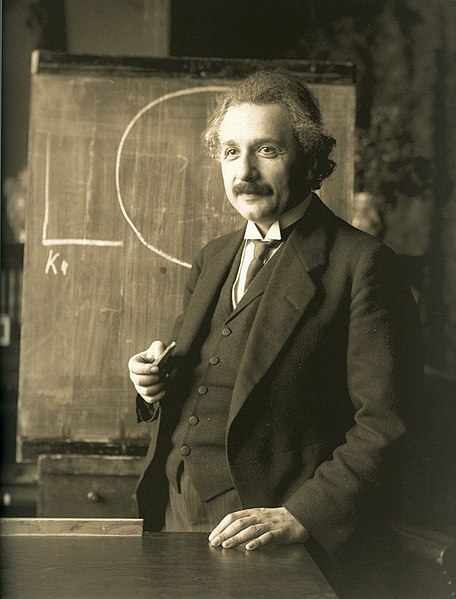 There is a certain school of thought that asserts that scientific genius is a thing of the past. After all, we haven’t seen the recent emergence of pivotal talents such as Galileo, Newton, Darwin or Einstein. Is it possible that fundamentally new ways to look at our world — that a new mathematics or a new physics is no longer possible?
There is a certain school of thought that asserts that scientific genius is a thing of the past. After all, we haven’t seen the recent emergence of pivotal talents such as Galileo, Newton, Darwin or Einstein. Is it possible that fundamentally new ways to look at our world — that a new mathematics or a new physics is no longer possible?
In a recent essay in Nature, Dean Keith Simonton, professor of psychology at UC Davis, argues that such fundamental and singular originality is a thing of the past.
[div class=attrib]From ars technica:[end-div]
Einstein, Darwin, Galileo, Mendeleev: the names of the great scientific minds throughout history inspire awe in those of us who love science. However, according to Dean Keith Simonton, a psychology professor at UC Davis, the era of the scientific genius may be over. In a comment paper published in Nature last week, he explains why.
The “scientific genius” Simonton refers to is a particular type of scientist; their contributions “are not just extensions of already-established, domain-specific expertise.” Instead, “the scientific genius conceives of a novel expertise.” Simonton uses words like “groundbreaking” and “overthrow” to illustrate the work of these individuals, explaining that they each contributed to science in one of two major ways: either by founding an entirely new field or by revolutionizing an already-existing discipline.
Today, according to Simonton, there just isn’t room to create new disciplines or overthrow the old ones. “It is difficult to imagine that scientists have overlooked some phenomenon worthy of its own discipline,” he writes. Furthermore, most scientific fields aren’t in the type of crisis that would enable paradigm shifts, according to Thomas Kuhn’s classic view of scientific revolutions. Simonton argues that instead of finding big new ideas, scientists currently work on the details in increasingly specialized and precise ways.
And to some extent, this argument is demonstrably correct. Science is becoming more and more specialized. The largest scientific fields are currently being split into smaller sub-disciplines: microbiology, astrophysics, neuroscience, and paleogeography, to name a few. Furthermore, researchers have more tools and the knowledge to hone in on increasingly precise issues and questions than they did a century—or even a decade—ago.
But other aspects of Simonton’s argument are a matter of opinion. To me, separating scientists who “build on what’s already known” from those who “alter the foundations of knowledge” is a false dichotomy. Not only is it possible to do both, but it’s impossible to establish—or even make a novel contribution to—a scientific field without piggybacking on the work of others to some extent. After all, it’s really hard to solve the problems that require new solutions if other people haven’t done the work to identify them. Plate tectonics, for example, was built on observations that were already widely known.
And scientists aren’t done altering the foundations of knowledge, either. In science, as in many other walks of life, we don’t yet know everything we don’t know. Twenty years ago, exoplanets were hypothetical. Dark energy, as far as we knew, didn’t exist.
Simonton points out that “cutting-edge work these days tends to emerge from large, well-funded collaborative teams involving many contributors” rather than a single great mind. This is almost certainly true, especially in genomics and physics. However, it’s this collaboration and cooperation between scientists, and between fields, that has helped science progress past where we ever thought possible. While Simonton uses “hybrid” fields like astrophysics and biochemistry to illustrate his argument that there is no room for completely new scientific disciplines, I see these fields as having room for growth. Here, diverse sets of ideas and methodologies can mix and lead to innovation.
Simonton is quick to assert that the end of scientific genius doesn’t mean science is at a standstill or that scientists are no longer smart. In fact, he argues the opposite: scientists are probably more intelligent now, since they must master more theoretical work, more complicated methods, and more diverse disciplines. In fact, Simonton himself would like to be wrong; “I hope that my thesis is incorrect. I would hate to think that genius in science has become extinct,” he writes.
[div class=attrib]Read the entire article after the jump.[end-div]
[div class=attrib]Image: Einstein 1921 by F. Schmutzer. Courtesy of Wikipedia.[end-div]

 Aside from founding classical mechanics — think universal gravitation and laws of motion, laying the building blocks of calculus, and inventing the reflecting telescope Isaac Newton made time for spiritual pursuits. In fact, Newton was a highly religious individual (though a somewhat unorthodox Christian).
Aside from founding classical mechanics — think universal gravitation and laws of motion, laying the building blocks of calculus, and inventing the reflecting telescope Isaac Newton made time for spiritual pursuits. In fact, Newton was a highly religious individual (though a somewhat unorthodox Christian).